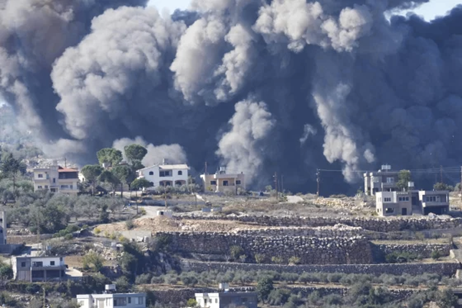Lebanon – The Forgotten Hostage of the Gaza Conflict

125 hostages remain in the custody of Hamas following the October 7 attack on southern Israel. The fate of these hostages is central to the complex negotiation process between Hamas and Israel. Hamas’s refusal to release those hostages without a clear Israeli commitment to cease its military campaign in Gaza is the main obstacle to ending the war.
Simultaneously, in Lebanon, Hezbollah conditions any attempt to halt its ongoing attacks on northern Israel, which the organization initiated on October 8, on the cessation of the war in Gaza. This strategy has effectively made Lebanon a secondary hostage to the Gaza conflict.
Additionally, recent weeks have seen a further escalation of the conflict. Hezbollah has intensified its use of Iranian-made UAVs against high-value Israeli military targets located further away from the border, while Israel has expanded its targeted assassination campaign against Hezbollah field commanders.
Hezbollah’s linkage of the two fronts demonstrates its unilateral decision-making model, disregarding Lebanon’s weak and dysfunctional government and parliament. The recent meeting between Hezbollah’s leadership and top Hamas representatives underscored this message to all parties involved.
The risk of a catastrophic war with Israel, posted by the fighting initiated and perpetuated by Hezbollah, holds limited importance in Hezbollah's leadership calculation. As a crucial element in the “axis of resistance” led by Iran, alongside other proxies such as the Houthis in Yemen and the Shia militias in Iraq, Hezbollah prioritizes Tehran’s interests over those of Beirut.
As cross-border fire has intensified in recent weeks, Lebanon has also recently marked the 16th anniversary of Hezbollah's violent take-over of central Beirut on May 7, 2008. This move, in response to government decisions regarding the organization's illegal independent communications system, highlighted the domestic threat posed by Hezbollah and its armed factions.
Today, as in 2008, Hezbollah leverages its military capabilities to impose its interests over those of Lebanon and its weak government, risking the fate of the entire country. The organization categorically ignores the calls from opposition leaders to halt its fire and so far, it has rejected all diplomatic attempts to defuse the border situation.
Israeli decision-makers and the defense establishment have made it clear that continued Hezbollah attacks on northern Israel will force further escalation of military operations. As an unfavorable last resort, Israel may have no choice but to carry out a ground attack on Lebanese territory, likely leading to an all-out war.
Following the 2006 war, Hezbollah’s secretary-general, Hassan Nasrallah, admitted that he was mistaken. If he had known that the terror attack his organization carried out which started the war would lead to a full-scale devastating war, he would not have approved it. Today, Nasrallah appears close to making the same mistake again.
With the fighting in Gaza far from ending, the linkage Hezbollah has created between Gaza and Lebanon, and the spiraling escalation in the fighting between Israel and Hezbollah, it seems the fate of Lebanon is out of the hands its government and the formal state institutions.
Hezbollah, its patrons in Tehran, and Hamas leadership are those who are setting the course and pace of the evolving events. Lebanon is just a hopeless hostage of their decisions, waiting to see whether their calculations will set it free or force it into even greater catastrophe.
Dror Doron is a senior advisor at United Against Nuclear Iran (UANI) focusing on Hezbollah and Lebanon. He spent nearly two decades as a senior analyst in the Office of Israel’s Prime Minister. Dror is on Twitter @DrorDoron
Receive Iran News in Your Inbox.
Eye on Iran is a news summary from United Against Nuclear Iran (UANI), a section 501(c)(3) organization. Eye on Iran is available to subscribers on a daily basis or weekly basis.